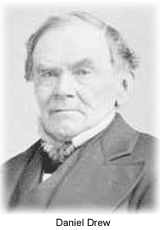Daniel Drew was born in Carmel, New York, in the dairy country north of New York City. He received little schooling and remained virtually illiterate throughout his life. Drew worked in his father’s cattle business, but the elder Drew’s death in 1812 forced his son, age 15, to enter the War of 1812 as a hired substitute.
Following the war, Drew worked as a cattle drover, moving herds from upstate New York into the City. Later, Drew became a successful cattle buyer and extended his operations into areas west of the Alleghenies.
 In 1834, Drew mounted a challenge against Cornelius Vanderbilt by entering the steamship business on the Hudson River. By undercutting prevailing prices, Drew prospered. He later provided service on Lake Champlain.
Drew, Robinson and Company, a Wall Street brokerage and bank, was founded in 1844.
Taking advantage of the dislocations sparked by the Panic of 1857, Drew became one of the directors of the Erie Railroad. His outrageous manipulation of the stock and company assets set the standard for the era. Nevertheless, Drew was outmaneuvered by Vanderbilt and a partner in an 1864 battle of Erie stock. Drew lost heavily and became intent upon punishing Vanderbilt.
With the assistance of Jay Gould and James Fisk, Drew managed to inflict his revenge on Vanderbilt in the Erie War, an episode that ruined thousands of investors. Drew’s victory was not lasting; his partners betrayed him by manipulating the Erie stock upward, ruining Drew who had shorted it. The Panic of 1873 and the following depression completed his downfall. His remaining years consisted of loneliness, bitterness and dependence upon his son.
Drew’s life presented a strange contrast. Totally without scruples in his business dealings, Drew nevertheless regarded himself as a devout Methodist. He was responsible for founding Drew Theological Seminary, but was unable to complete other philanthropic pledges on account of bankruptcy.
In 1834, Drew mounted a challenge against Cornelius Vanderbilt by entering the steamship business on the Hudson River. By undercutting prevailing prices, Drew prospered. He later provided service on Lake Champlain.
Drew, Robinson and Company, a Wall Street brokerage and bank, was founded in 1844.
Taking advantage of the dislocations sparked by the Panic of 1857, Drew became one of the directors of the Erie Railroad. His outrageous manipulation of the stock and company assets set the standard for the era. Nevertheless, Drew was outmaneuvered by Vanderbilt and a partner in an 1864 battle of Erie stock. Drew lost heavily and became intent upon punishing Vanderbilt.
With the assistance of Jay Gould and James Fisk, Drew managed to inflict his revenge on Vanderbilt in the Erie War, an episode that ruined thousands of investors. Drew’s victory was not lasting; his partners betrayed him by manipulating the Erie stock upward, ruining Drew who had shorted it. The Panic of 1873 and the following depression completed his downfall. His remaining years consisted of loneliness, bitterness and dependence upon his son.
Drew’s life presented a strange contrast. Totally without scruples in his business dealings, Drew nevertheless regarded himself as a devout Methodist. He was responsible for founding Drew Theological Seminary, but was unable to complete other philanthropic pledges on account of bankruptcy.